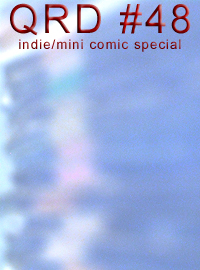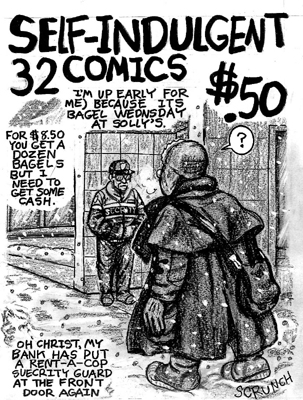





February 2011

City: Vancouver, BC
Comics: Around 175 mini-comics, digests, comic books plus comic strips, illustration, editorial cartoons, reviews, paintings, etc…
Websites: www.colinupton.com, colinupton.tumblr.com
QRD - How old were you when you first got into comics & did you always stick with them or did you come back to them?
Colin - I collected American comics (there were no Canadian comics) like most boys my age, but not in any sort of systematic way except for Classics Illustrated. I also read Mad magazine, newspaper strips, & British comics including some my father collected during WW2. But my interest in doing comics was really inspired by English translations of European comics Asterix the Gaul & Tintin in the early 1970s. I stopped reading American comics around the mid-seventies but I eagerly looking forward to each new translation of Asterix & Tintin. Then Heavy Metal Magazine came out.
QRD - What was the first comic book you ever bought?
Colin - No idea. Long time ago. when you were a kid growing up in the 1960s comics were everywhere.
QRD - How old were you when you put out your first comic?
Colin - After dropping out of art school in 1985. I was 25. A pair of mini-comics, Socialist Turtle & The Granville Street gallery on a friends hand cranked gestetnar.
QRD - What decade do you think produced the best comics?
Colin - The next one. The most important decade for me personally was the 1980's which saw the evolution of the graphic novel, Raw & Wierdo magazines, the small press comics movement, European comics & the explosion of Indie comics. Manga was still in it's infancy in North America.
QRD - Why comics instead of just writing or drawing?
Colin - One reason is that I have a learning disability, I am somewhat dyslexic. Before computers I found expressing myself coherently in writing almost impossible, comics was a language I could use. I think it was Will Eisner who said that he couldn't write or draw well, but if he put the two together he could achieve something. I'm paraphrasing. Mostly because I am a cartoonist & that is the way I'm most comfortable expressing
QRD - Do you see mini-comics & indie comics as paths to mainstream comics or as their own unique media?
Colin - They have been both. There are those who are content to stay in small press, but at the same time few of the Indie cartoonists who emerged in the 1980s didn't have their start in small press. Some have found their way to mainstream comics in a desperate attempt by those publishers to stay relevant.
QRD - How many copies of your comic do you print in your first run?
Colin - 50-100, whatever I can afford.
QRD - How much do you think comics should cost?
Colin - Four times your cost of production. Plus postage. Postage rates are getting out of hand.
QRD - How many books do you produce a year & how many would you like to?
Colin - 2010 was a productive year with 19 small press mini-comics & digests. I would like to do as many as I feel like.
QRD - Do you think stories should be serialized or delivered as complete works?
Colin - Complete works. Comics as periodicals is going the way of the dodo (unless you're doing web comics).
QRD - How are comic strips different than comic books & which medium do you prefer?
Colin - Comic strips are a challenge because of their brevity. Even an eight-page mini-comic has more space & thus time than your average comic strip. I'll do either, but I prefer comic books.
QRD - How long is it from when you start a comic until it's printed?
Colin - Depends. Days, sometimes a week or longer in the case of a painted mini-comic, sometimes it depends on the research required. Conversely I've drawn a mini-comic one evening & printed it the next day.
QRD - What do you better with your comics now than when you first started?
Colin - The arts gotten a whole lot better, I'm learning to accept & work within my considerable limitations as an artist. I am no longer afraid of tonal work. My lettering has improved (it began really terribly) & the spelling is marginally better although that may be hard to believe.
QRD - At what point in the artistic process do you work digitally?
Colin - Generally I don't. I did use a computer for the title on the front cover, Self-Indulgent Comics #33 & sometimes use it for copy as in Self-Indulgent Comics #5 when there were a lot of scientific terms & I wanted to spell the words right. I print out the copy & paste it to the original art.
QRD - What do you think of digital comics & webcomics?
Colin - The cleaner & more polished the art becomes the more antiseptic, like the smooth, dead surface of a new car. I prefer to see the human hand in art. There are people who can draw digitally & still look like it was rendered by a human, but that takes skill. Web comics are today what small press comics were in my day, although I haven't seen much online that impresses me yet.
QRD - Do you prefer working in colour or black & white?
Colin - Black & white is what I do, colour is a hassle & expensive to print. I'm not confident with colour yet. Colour is tricky because so many painted comics I've seen lack clarity. As I like to say, colour is for the weak.
QRD - How many different people should work on a comic & what should their jobs be?
Colin - One, maybe two in exceptional circumstances. artist & writer. Plus a tech guy if you want to do web comics. Editors are for spell check, don't trust a computer for that job.
QRD - How do you find collaborators?
Colin - I go to the employment office & look for the most desperate. I don't often work with writers, when I have it is because they've asked me.
QRD - How tight do you think a script should be as far as telling the artist what to draw?
Colin - Everyone has their own style of working, there must be give & take & I would expect the writer & artist to be communicating with each other at all stages of a project.
QRD - What comic book person would you be most flattered to be compared to?
Colin - I have been called "Canada's answer to Harvey Pekar," which was nice.
QRD - What do your friends & family think of your comics?
Colin - Most of my friends are cartoonists. My family finds it all very mysterious, although I suspect my art-loving mum is, grudgingly, secretly pleased to have an artist in the family. My family wishes my comics were more upbeat. Family & friends all share a fear of appearing in my comics.
QRD - What do you think of superheroes?
Colin - Nothing to do with me.
QRD - Marvel or DC?
Colin - Potato potato, tomato tomato.
QRD - What comic characters other than your own would you like to work with?
Colin - The Flag Smasher. Look it up..
QRD - Ideally would you self-publish?
Colin - Well, in my own small way I already I do. If I wanted to take it to the next level, sure, if I won the lottery.
QRD - What conventions do you try to attend & why?
Colin - I am at the annual Word on the Street Book & Magazine Fair here in Vancouver & any other local con that will allow me through the door. Vancaf is an exciting new small press convention here in Vancouver & I've attended comicons at the Emilly Carr University of Art. My audience doesn't generally go to comic book conventions. I don't have the money to go far although I've done a couple of cons in Victoria BC & in 2011 I was at SPACE in Columbus, Ohio.
QRD - What do you do to promote your books?
Colin - Next to nothing. I post on Facebook & Tumblr.
QRD - Do you think your comics are well suited to comic shops or would sell better elsewhere?
Colin - Depends on the comic shop, I've seen some where you are hard pressed to find any comic books period. In Vancouver we have several outstanding Indie-friendly comic shops. Mini-comics don't sell well in most bookstores, just not durable enough. There is a hipster bookstore in a small town on Vancouver Island where they sell quite well
QRD - What other medium would you like to see some of your comics made into (television, film, games, action figures, etc.)?
Colin - Plays, television, film, radio plays. the world's dullest role-playing game. I'd love an "action" figure of myself.
QRD - Do you consider yourself a comic collector or a comic reader or both?
Colin - Comic reader. I'm happy to borrow from friends or take graphic novels out of the library if that means I don't have to buy them to read them. I'm poor. If I really like them I'll wait & buy them on sale.
QRD - What do you see as the most viable mediums for comics distribution 10 years from now?
Colin - I predict that 10 years from now no creative person will be paid for their work. Hooray! Seriously, graphic novels will continue if they can deliver a reading experience that is unavailable online or on a digital reader with size, quality of design, & production. We have more to offer than print prose books. I imagine many comics will be designed for reading on E-readers, perhaps on a subscription basis.
QRD - What would you like to see more people doing with comics?
Colin - Everything. Try everything, see what works.
QRD - Anything else?
Colin - "Is this a comics convention or a craft fair?"







